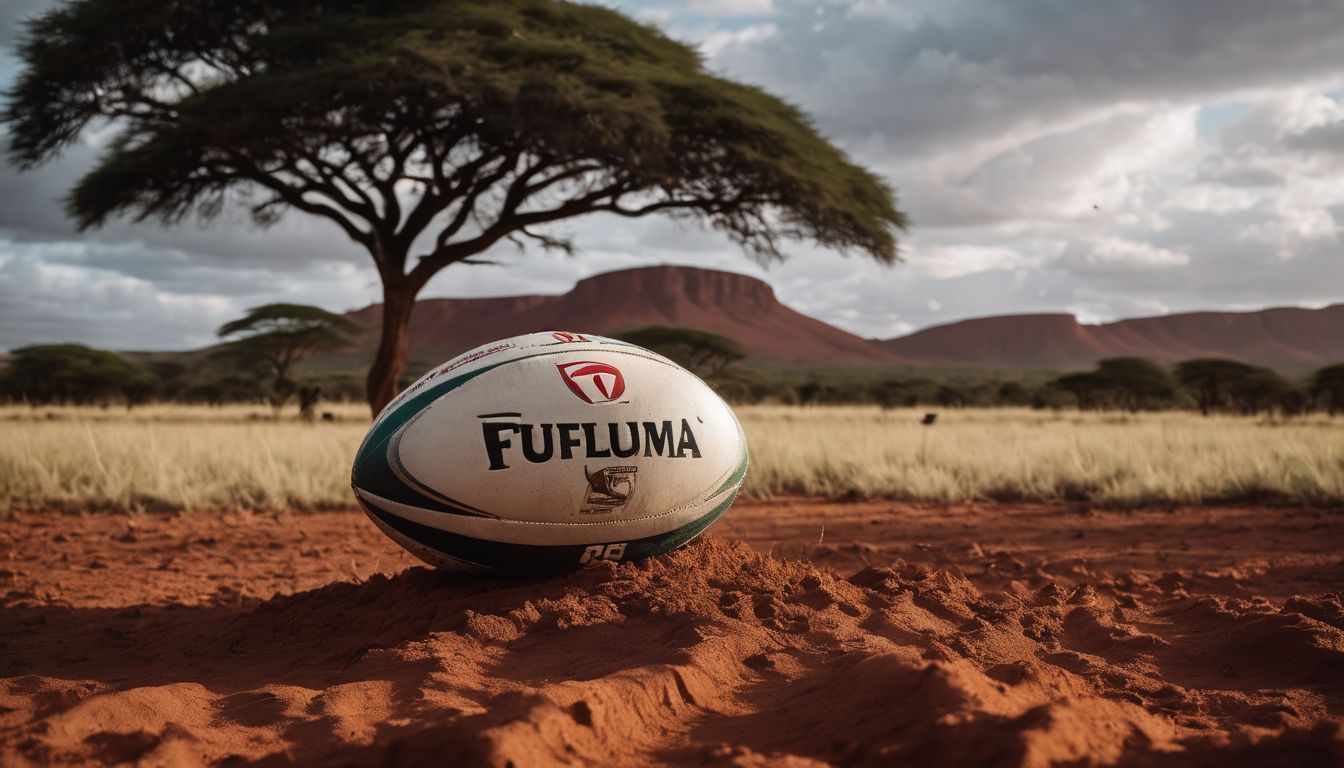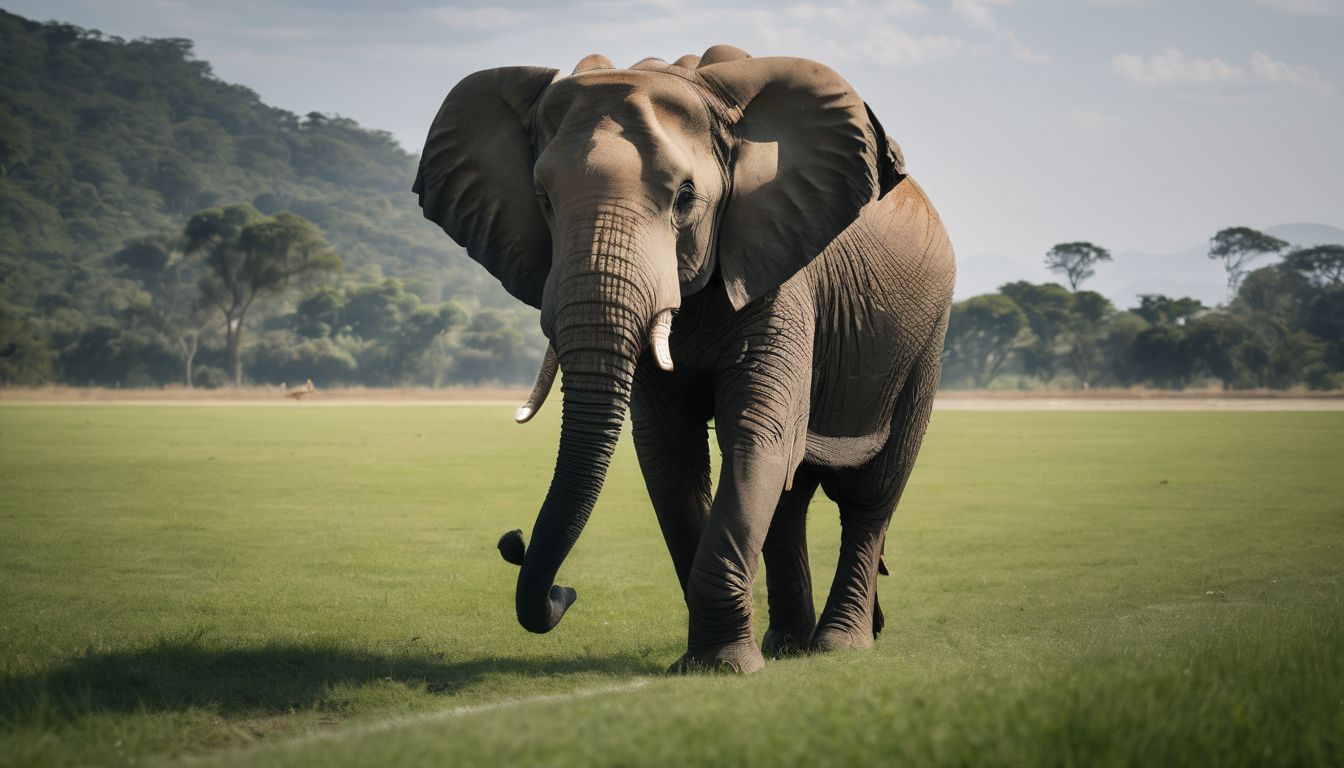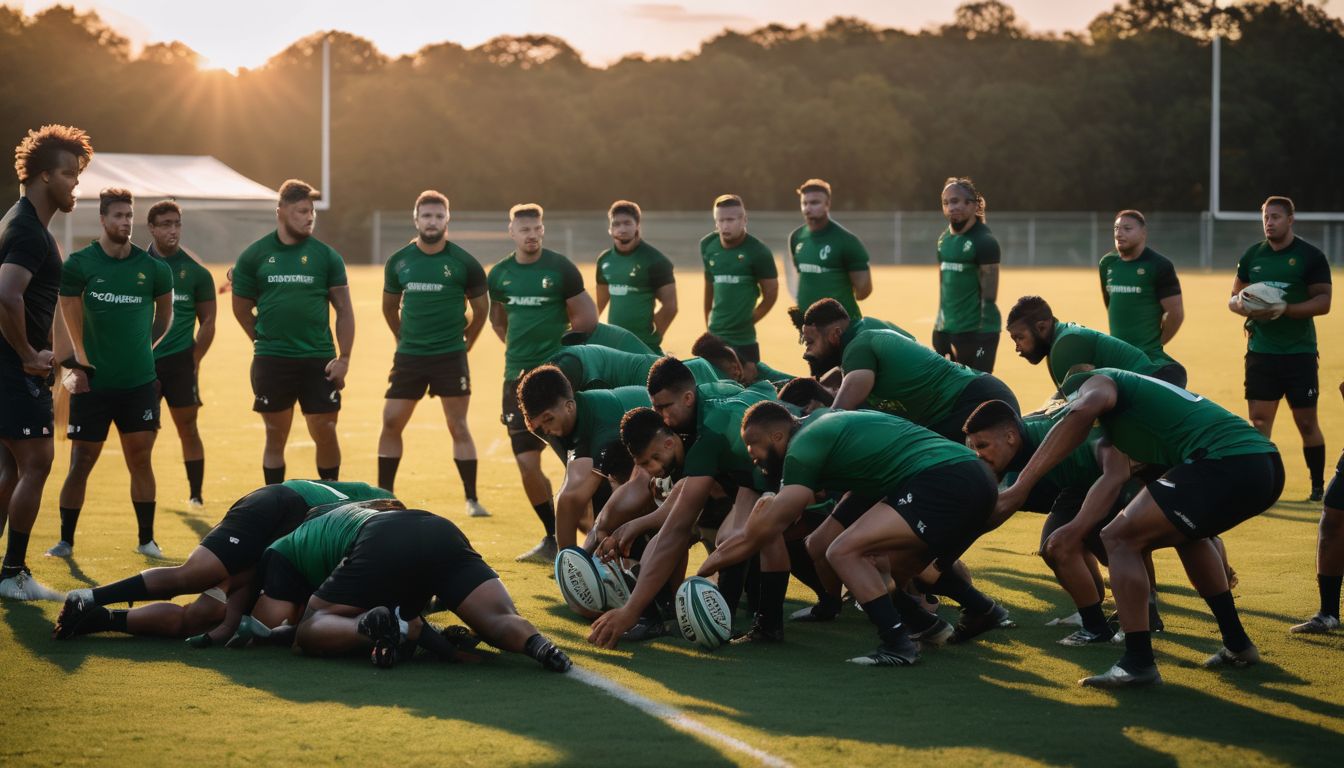Rugby fans often wonder why Kenya shines in sevens. The Kenyan team has clinched the Safari Sevens rugby tournament ten times, a testament to their prowess. Our article dives into Kenya’s love for the game, from thrilling victories to tackling challenges on and off the pitch.
Get ready for a dynamic run through Kenya’s rugby landscape!
Key Takeaways
- Kenya’s national rugby sevens team, known as Shujaa, has won the Safari Sevens tournament ten times, confirming their strength in the sport.
- The Kenyan rugby team first participated in the World Rugby Sevens Series during the 2000/2001 season and became a regular participant from 2004/2005 onwards.
- Humphrey Kayange is a celebrated figure in Kenyan rugby who has garnered international recognition for his contributions to the game.
- Financial struggles and competition from sports like football and athletics have led to a decline in rugby popularity which KRU is addressing through various initiatives.
- Efforts are being made by KRU to build stronger teams with youth development programs and regain lost popularity through grassroots initiatives and digital marketing campaigns.
History of Rugby Sevens in Kenya
The history of rugby sevens in Kenya dates back to the establishment of the national team and their participation in international tournaments. The sport has seen success at both the national and club levels, with the Safari Sevens playing a significant role in its development.
National team
Kenya’s national rugby sevens team, affectionately known as Shujaa, stands tall among the country’s sports achievements. Their formidable presence on the pitch has captured the hearts of fans and punctuated Kenya’s sports narrative with thrilling victories.
As early entrants into the international scene, they proved their worth by bagging ten Safari Sevens titles and becoming a core participant in the World Rugby Sevens Series from the 2004/2005 season onwards.
Key figures like Humphrey Kayange have propelled Kenyan rugby to global recognition, setting benchmarks for up-and-coming players. With each tournament at home or abroad, Shujaa reinforces its status as a powerhouse in Africa’s rugby sphere.
The team continually draws upon a deep talent pool that consistently shows skilful play and unwavering determination during competitions such as the Safari Sevens held at Nairobi’s RFUEA Grounds – an event symbolising not only Kenya’s love for rugby but also their prowess in hosting premier sports tournaments.
Honors and championships
- The team has won the Safari Sevens tournament an impressive ten times, cementing their position as a force to be reckoned with in the rugby sevens format.
- Their success also extends internationally, with the team earning its first invitation to the World Rugby Sevens Series in the 2000/2001 season and becoming a core team in the 2004/2005 season.
- Rugby sevens legend Humphrey Kayange made history by becoming the first Kenyan to be recognised for his significant contributions to the sport, further elevating Kenya’s status in international rugby.
Importance of the Safari Sevens
The Safari Sevens holds significant importance in the world of rugby, serving as a platform for showcasing both local and international talent. This tournament not only attracts professional teams but also provides an opportunity for amateur clubs to participate.
As Africa’s premier 7-a-side competition, the Safari Sevens plays a vital role in promoting and nurturing rugby talent within Kenya and beyond. The event serves as a focal point for enthusiasts and players alike, contributing to the sport’s popularity and development in the region.
With its rich history and tradition, the Safari Sevens is an integral part of Kenya’s sports culture, drawing attention from both local fans and international rugby communities.
Reasons for the Decline in Popularity of Kenyan Rugby
Empty stadiums, financial struggles, and competition from other sports have contributed to the decline in popularity of Kenyan rugby. However, recent successes at the Safari Sevens have reignited interest and hope for the future of the sport.
Empty stadiums
Despite the strong pool of rugby 7s players in Kenya and the dedicated following for the sport, empty stadiums have become a concern. This presents a challenge for the growth of rugby in Kenya, affecting not only the atmosphere at matches but also potentially impacting financial support for the sport.
With efforts to position Kenya to host a World Rugby 7s Series event and ongoing success in international competitions, addressing the issue of empty stadiums is crucial to maintain and enhance the popularity and support for rugby sevens in Kenya.
Lack of attendance poses a significant obstacle as it diminishes the vibrant energy that enthusiastic fans bring to games. Moreover, it hampers revenue generation which can affect resources allocated towards nurturing local talent as well as supporting professional teams and clubs.
Financial struggles
Following the issue of empty stadiums, another factor contributing to the decline in popularity of Kenyan rugby is financial struggles. This aspect has had a significant impact on the sport’s ability to attract and retain players, as well as affecting the overall development of rugby in Kenya.
The lack of adequate funding has hindered the Kenya Rugby Union‘s efforts in organising and promoting rugby events, including vital competitions like the Safari Sevens tournament. Additionally, financial constraints have limited investment in grassroots programmes and resources for developing young talent, which are essential for nurturing future generations of rugby players to sustain the sport’s growth.
Furthermore, without sufficient financial backing, it becomes challenging for professional rugby players to fully commit to their careers and training due to limited support systems available.
Competition from other sports
Other sports, such as football and athletics, have gained popularity in Kenya, posing a challenge to rugby’s fan base. Football is deeply rooted in Kenyan sports culture due to its widespread following and large fan base.
Athletics also competes for attention with its international success at events like the Olympic Games. The rise of these sports has led to increased competition for both resources and spectators, impacting the prominence of rugby in the country.
Moving forward – Reasons for the Decline in Popularity of Kenyan Rugby
Recent Success at the Safari Sevens
Shujaa, the Kenyan national sevens team, retained their title at the Safari Sevens tournament with impressive performances against international representative sides. To learn more about Kenya’s rugby success and its future in the sport, keep reading!
Shujaa’s retention of the title
Shujaa, the Kenyan national rugby sevens team, successfully defended their title at the Safari Sevens tournament. This remarkable feat showcases their dominance in the sport and solidifies their position as one of the most successful sporting teams representing Kenya.
Impressively, they won this prestigious tournament for a record-tying tenth time, demonstrating their exceptional skill and determination on the rugby field.
Kenya’s victory at the Safari Sevens is a testament to the team’s ongoing success in international competitions. The retention of the title not only reflects Shujaa’s outstanding performance but also highlights Kenya’s strong pool of rugby sevens players.
Impressive performances
Continuing with their successful streak, the Kenya national rugby sevens team displayed impressive performances at the Safari Sevens tournament. The team’s agility and skill on the field were evident as they dominated their opponents, showcasing their prowess in the sport.
With a strong pool of talented players, including rugby sevens legend Humphrey Kayange, Kenya’s success in international competitions has been consistent, cementing its reputation as a force to be reckoned with in the world of rugby sevens.
Additionally, their dedication and determination have contributed to earning recognition for their contributions to the sport.
Maintaining momentum from previous victories, Kenya’s national rugby sevens team delivered remarkable displays during the Safari Sevens tournament, captivating fans with their exceptional speed and teamwork.
Future of Rugby in Kenya
The future of Rugby in Kenya looks promising with the upcoming All-African Games, efforts to build a stronger team and regain popularity among sports enthusiasts. Read more about the exciting developments in Kenyan rugby!
Upcoming All-African Games
The Kenya national rugby sevens team is gearing up for the upcoming All-African Games, which presents a crucial opportunity to showcase their skills on the continental stage. As Africa’s leading rugby powerhouse, Kenya aims to assert its dominance in this prestigious multi-sport event.
The team’s preparations are underway as they focus on fine-tuning their gameplay and strategies to secure success at the All-African Games. With a strong pool of talented players and unwavering determination, Kenya’s national rugby sevens team is poised to make a significant impact at the upcoming event.
Efforts are in place to ensure that Kenya fields a formidable squad for the All-African Games as they aim to continue their impressive track record in international competitions. The upcoming tournament serves as an important platform for showcasing the depth of talent and skill within Kenyan rugby, providing an opportunity for fans to witness exhilarating performances from the country’s top rugby sevens athletes.
Building a stronger team
To build a stronger team, the Kenya Rugby Union (KRU) has been focusing on nurturing young talent through development programs. Identifying and training promising players from a grassroots level is key to building a competitive squad.
Additionally, investing in coaching staff and providing them with the necessary resources can greatly contribute to enhancing the skill set of the national rugby sevens team.
Efforts are also underway to establish partnerships with schools and clubs to create a seamless pathway for aspiring players. By fostering a strong support system within local communities, Kenya aims to bolster its pool of talented rugby sevens athletes.
The continuous development and expansion of youth programs will be pivotal in sustaining long-term success for Kenyan rugby sevens.
Efforts to regain popularity
After building a stronger team, the Kenya Rugby Union (KRU) has been focusing on rejuvenating the sport’s popularity in the country. They have initiated various grassroots programmes to engage and attract young talents, aiming to bolster rugby participation at the community level.
Additionally, KRU has collaborated with local businesses and sponsors to secure financial support for promoting rugby across different regions of Kenya. By organising outreach events and school tournaments, KRU aims to foster enthusiasm for rugby among youth, cultivating a new generation of fans and players who can sustain and elevate the sport’s visibility in Kenya.
Furthermore, efforts to regain popularity also involve leveraging digital platforms to broaden the audience reach for Kenyan rugby. The KRU is actively working on social media campaigns and live streaming initiatives for local matches and international competitions featuring Kenyan teams.
Conclusion
In conclusion, rugby in Kenya has seen remarkable success, with the national sevens team achieving significant victories and accolades. The Safari Sevens tournament continues to be a highlight, drawing international teams and captivating local fans.
Efforts are underway to revitalise the sport’s popularity and build an even stronger team for future competitions. With dedicated players and ongoing support, the future of rugby in Kenya looks promising.
FAQs
1. What is the Safari Sevens?
The Safari Sevens is a popular rugby sevens tournament hosted in Kenya, featuring local and international teams competing for the title.
2. Who are the Shujaa in Kenyan Rugby?
Shujaa is the name of the Kenyan national sevens team that competes in global rugby series and fixtures, representing Kenya with skill and pride.
3. How significant is rugby sevens to sports in Kenya?
Rugby sevens has become a key sport in Kenya, contributing to its sporting success with strong tournaments and a growing fan base across the country.
4. Is there an East African Sevens Circuit involving Kenya?
Yes, Kenya participates actively in the East African Sevens Circuit, highlighting rugby development in Africa through regional competitions.
5. Does rugby sponsorship play a role in Kenyan Rugby’s growth?
Indeed, sponsorship plays a crucial part by providing financial support for teams like Samurai International Side as well as funds for organising events such as rugby tournaments within Kenya.












